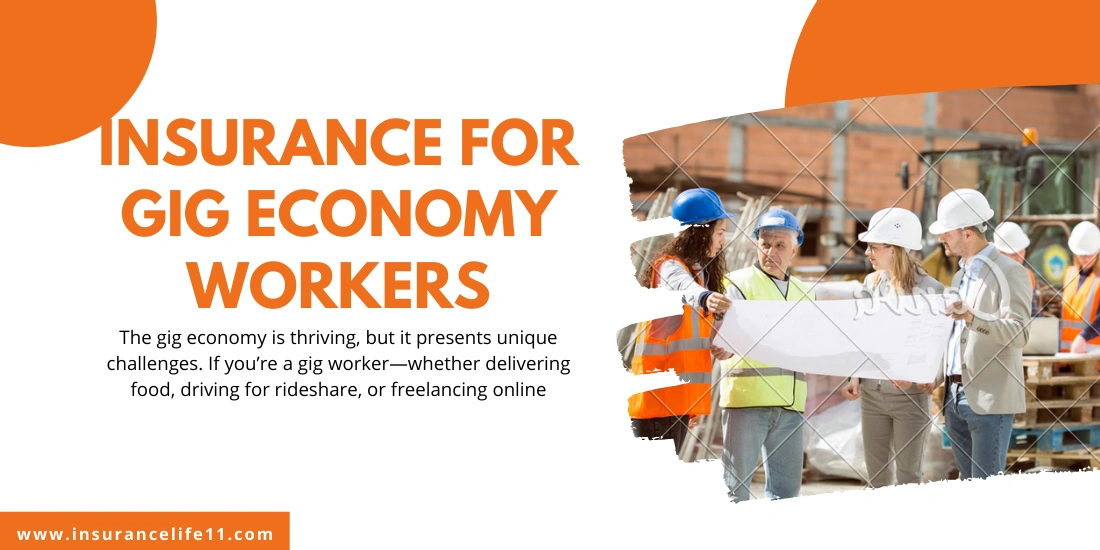Understanding Insurance for Gig Economy Workers
The gig economy is thriving, but it presents unique challenges. If you’re a gig worker—whether delivering food, driving for rideshare, or freelancing online—you’ve likely considered how to safeguard your finances. Insurance serves as your safety net, but navigating the right type of coverage can be daunting.
Let’s explore why Insurance for Gig Economy Workers is essential, the types available, and how to find coverage that suits your needs.
Introduction to the Gig Economy
What Is the Gig Economy?
The gig economy consists of workers who earn income on a per-job or project basis. Unlike traditional employees, gig workers don’t receive a steady salary or benefits. Instead, they enjoy the flexibility to choose when, where, and how they work.
Examples of Popular Gig Jobs
Consider Uber drivers, DoorDash couriers, freelance graphic designers, and dog walkers using apps like Rover. The variety of gig jobs is as diverse as the individuals who perform them.
The Role of Technology in the Gig Economy
Technology significantly influences the gig economy, which is characterized by short-term or flexible jobs rather than traditional full-time positions. Popular platforms such as Uber, DoorDash, Fiverr, and Upwork exemplify this trend, utilizing technology to link workers with customers seeking their services.
Here are some important ways technology impacts the gig economy:
Easier Job Access
Technology simplifies the process for gig workers to find employment. Through apps and websites, they can easily sign up, explore job opportunities, and secure positions quickly. For instance, a freelance writer can connect with clients on Upwork, while a driver can find passengers via Uber.
Flexibility for Workers
Thanks to technology, workers have the freedom to choose their working hours and locations. They can log into apps when they want to work and log out when they need a break. This flexibility is a major draw for many individuals entering the gig economy.
Better Communication
Technology facilitates direct communication between workers and customers. For example, delivery apps enable customers to message their drivers for updates, and freelance platforms provide chat features for discussing job specifics.
Payment and Security
Apps and platforms manage payments, ensuring that workers receive their earnings securely and promptly. This means workers don’t have to pursue clients for payment, as the platforms handle all transactions.
Skill Development and Opportunities
Technology also aids gig workers in enhancing their skills. Numerous online tutorials, courses, and resources are available to support their professional growth. Additionally, it allows them to showcase their work and attract more clients.
While technology offers numerous advantages, it also presents challenges. Gig workers frequently encounter issues such as inconsistent income, lack of benefits, and heightened competition. Nevertheless, technology remains a driving force behind the expansion of the gig economy, solidifying its role in today’s job market.
The Need for Insurance in the Gig Economy
Lack of Traditional Employee Benefits
In a conventional job, you might receive health insurance, retirement benefits, and paid sick leave. As a gig worker, these benefits are generally not available, leaving you to manage them independently.
Financial Risks Unique to Gig Work
Each gig job carries its risks. Drivers may encounter road accidents, freelancers could face data breaches, and couriers might sustain injuries while working. Without insurance, these risks can quickly lead to financial hardship.
Long-Term Security Concerns
Gig work can be unpredictable. What if an injury prevents you from working for weeks? Insurance helps you prepare for the unexpected and secures your long-term financial stability.
Exploring Different Insurance Types
Health Insurance: Protecting Your Well-Being
Health insurance is essential. Even a small medical issue can lead to significant expenses. Look for plans that include coverage for routine check-ups, emergencies, and prescription medications.
Liability Insurance:
Covering Work-Related Mishaps
Liability insurance is vital for gig workers who engage with clients or utilize equipment. For instance, if you accidentally damage a client’s property or cause an accident, this insurance will safeguard you.
Disability Insurance:
Income Protection When You’re Injured
Accidents can occur at any time. Disability insurance ensures that you continue to receive income if you are unable to work due to an injury or illness.
Life Insurance:
Security for Your Loved Ones
If you have dependents, life insurance offers financial support for them in the event of your unexpected passing.
Vehicle Insurance for Drivers and Couriers
If your gig involves driving, your auto insurance may not cover accidents that happen while working. A commercial auto policy can bridge that gap.
Equipment Insurance for Freelancers and Creators
Freelancers who depend on costly tools—such as laptops, cameras, or software—should think about equipment insurance to guard against theft or damage.
Business Interruption Insurance
This type of insurance assists gig workers in recovering lost income due to unforeseen disruptions like natural disasters.
How to Find the Right Insurance
Steps to Evaluate Your Needs
Begin by evaluating the risks linked to your work. Do you drive for a living? If so, prioritize vehicle and liability insurance. Are you a freelance writer? Then health and disability insurance may be more important.
Sourcing Insurance as a Gig Worker
Gig platforms like Uber or Lyft sometimes provide discounted insurance options. Additionally, freelancers’ unions often offer access to affordable group plans. Online marketplaces like Healthcare.gov simplify the process of shopping for and comparing different options.
The Cost of Not Having Insurance
Financial Challenges Without Coverage
Without insurance, even small accidents or health issues can lead to significant expenses. Liability claims might result in lawsuits, and medical emergencies could deplete your savings.
Emotional and Mental Stress
The ongoing anxiety about potential “what if” situations can negatively impact your mental well-being. Having insurance provides peace of mind, knowing that you’re protected.
Strategies to Make Insurance Affordable
Leveraging Subsidies and Government Programs
Look into programs like Medicaid or Affordable Care Act subsidies if you meet the income criteria. These options can greatly reduce the cost of health insurance.
Comparing Plans to Save Costs
Utilize comparison tools to assess various plans. Sometimes, tweaking your deductible or coverage limits can significantly lower your premium.
Why Proactive Planning Matters
Insurance serves not only as a safety net but also as a means to foster resilience. By obtaining coverage, you’re investing in your future and ensuring that you can navigate life’s unexpected events without jeopardizing your financial stability.
Conclusion
The gig economy provides flexibility, but it also requires self-sufficiency. Insurance plays a vital role in safeguarding yourself against the unpredictability of gig work. Whether it’s health, liability, or disability insurance, taking the time to secure the right coverage can protect you from financial difficulties and offer you peace of mind.
FAQs
- What are the risks of working without insurance in the gig economy?
Operating without insurance exposes you to substantial costs from medical emergencies, accidents, or liability claims.
- How can I get affordable insurance as a gig worker?
Investigate government programs, benefits from gig platforms, and freelancers’ unions to discover cost-effective options.
- Are there any insurance benefits offered by gig platforms?
Certain platforms, such as Uber and Lyft, provide limited insurance plans or discounts for their drivers.









